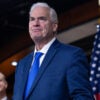Nearly 10 months after the Gulf oil spill, the Obama administration’s refusal to waive the Jones Act was still on the minds of a few Republicans at a House hearing last week.
Two freshman lawmakers, Reps. Jeff Landry (R-LA) and Blake Farenthold (R-TX), pressed retired Adm. Thad Allen, the national incident commander for the oil spill, about the Jones Act. The law regulates maritime commerce in U.S. waters and between ports.
Landry opened his questions by asking Allen if he felt the “waiver provisions in the Jones Act provide sufficient flexible during of emergencies” to which Allen simply answered, “Yes, they do.”
Later, Farenthold noted that some of the individual waivers that were granted took 10 days to process and asked whether that was an unreasonable time during an emergency. Allen responded that the waivers requested were “standby waivers” and were not involved in an “extremist or urgency situation.” Allen added that he received quick waivers when necessary for previous operations.
During the height of the spill, the Jones Act became a subject of much debate. Critics of the Obama administration said a temporary waiver would help with the cleanup. Keith Hennessey, the Bush administration’s point man for the Jones Act waivers during Hurricanes Katrina and Rita, said President Obama should exert his executive authority and suspend the law for 75 days to help with the Gulf oil spill cleanup.
The Jones Act also had its defenders at last week’s hearing. Rep. Candice Miller (R-MI) used her opening statement to note that Obama’s oil spill commission found the Jones Act in no way obstructed the cleanup effort. She maintained that the Jones Act was a “critical component of America’s maritime heritage” and blamed the media for misperception about the act.
Matthew McKillip is currently a member of the Young Leaders Program at The Heritage Foundation.



























9 Replies to “Jones Act Resurfaces at Oil Spill Hearing”